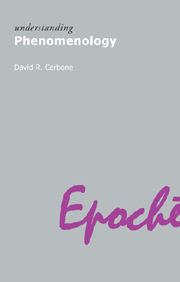Book contents
- Frontmatter
- Contents
- Acknowledgements
- Abbreviations
- Introduction: opening exercises
- 1 Husserl and the project of pure phenomenology
- 2 Heidegger and the existential turn
- 3 Sartre and subjectivity
- 4 Merleau-Ponty and the phenomenology of embodiment
- 5 Problems and prospects: phenomenology and its critics
- Questions for discussion and revision
- Further reading
- References
- Index
2 - Heidegger and the existential turn
- Frontmatter
- Contents
- Acknowledgements
- Abbreviations
- Introduction: opening exercises
- 1 Husserl and the project of pure phenomenology
- 2 Heidegger and the existential turn
- 3 Sartre and subjectivity
- 4 Merleau-Ponty and the phenomenology of embodiment
- 5 Problems and prospects: phenomenology and its critics
- Questions for discussion and revision
- Further reading
- References
- Index
Summary
Heidegger: life and works
Martin Heidegger was born 1889 in Messkirch, Germany. Heidegger's early education was with the Jesuit order, during which time he steeped himself in classical studies, especially Greek culture, language and philosophy. In his early years, Heidegger entered the Seminary of the Archdiocese of Freiburg with the intention of joining the priesthood. He briefly became a novice in the Jesuit order, but left after only two weeks for reasons of poor health. In 1907, Heidegger received a copy of Franz Brentano's On the Manifold Meaning of Being in Aristotle, a work that steered him in the direction of “the question of being” that would occupy him for the entirety of his philosophical career. However, it was not until after he left the seminary, following a brief period where he studied theology, that Heidegger devoted himself exclusively to philosophy. He received his PhD in 1913 and his Habilitation in 1915, at which time he became a lecturer at the University of Freiburg.
At Freiburg, Heidegger met Husserl (by then he had already made an extensive study of Husserl's phenomenology). Heidegger's relationship with Husserl, which included an assistantship from 1919 to 1923, had a profound effect on the shape of his philosophy, inaugurating what some have called his “phenomenological decade”. After a short stint as an associate professor at Marburg, Heidegger eventually succeeded Husserl as professor of philosophy at Freiburg when Husserl retired in 1928. Husserl had hand-picked Heidegger as his successor, viewing him as the means by which his phenomenological investigations might be continued in his eventual absence.
- Type
- Chapter
- Information
- Understanding Phenomenology , pp. 39 - 67Publisher: Acumen PublishingPrint publication year: 2006



